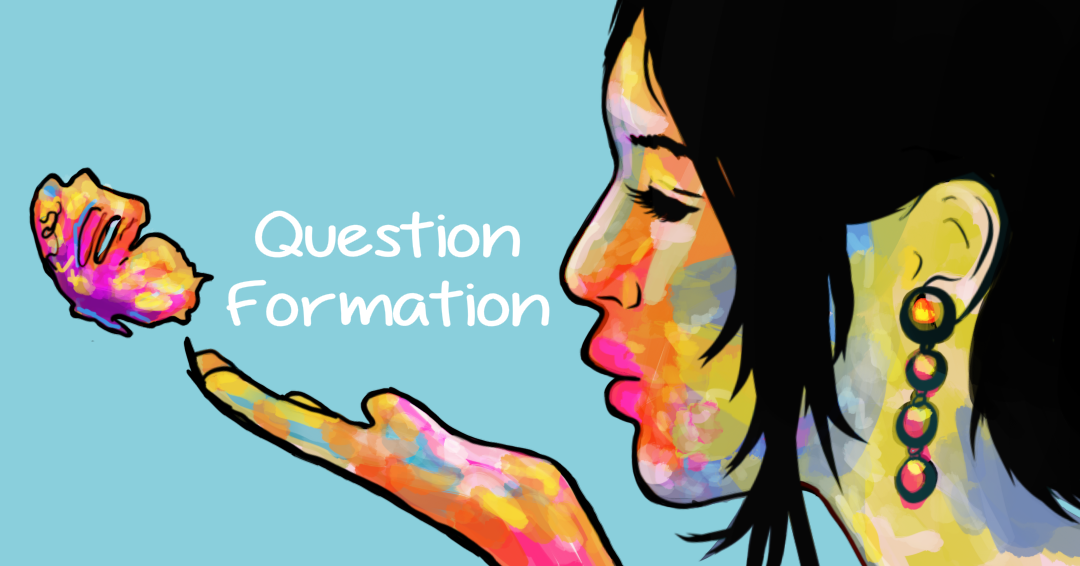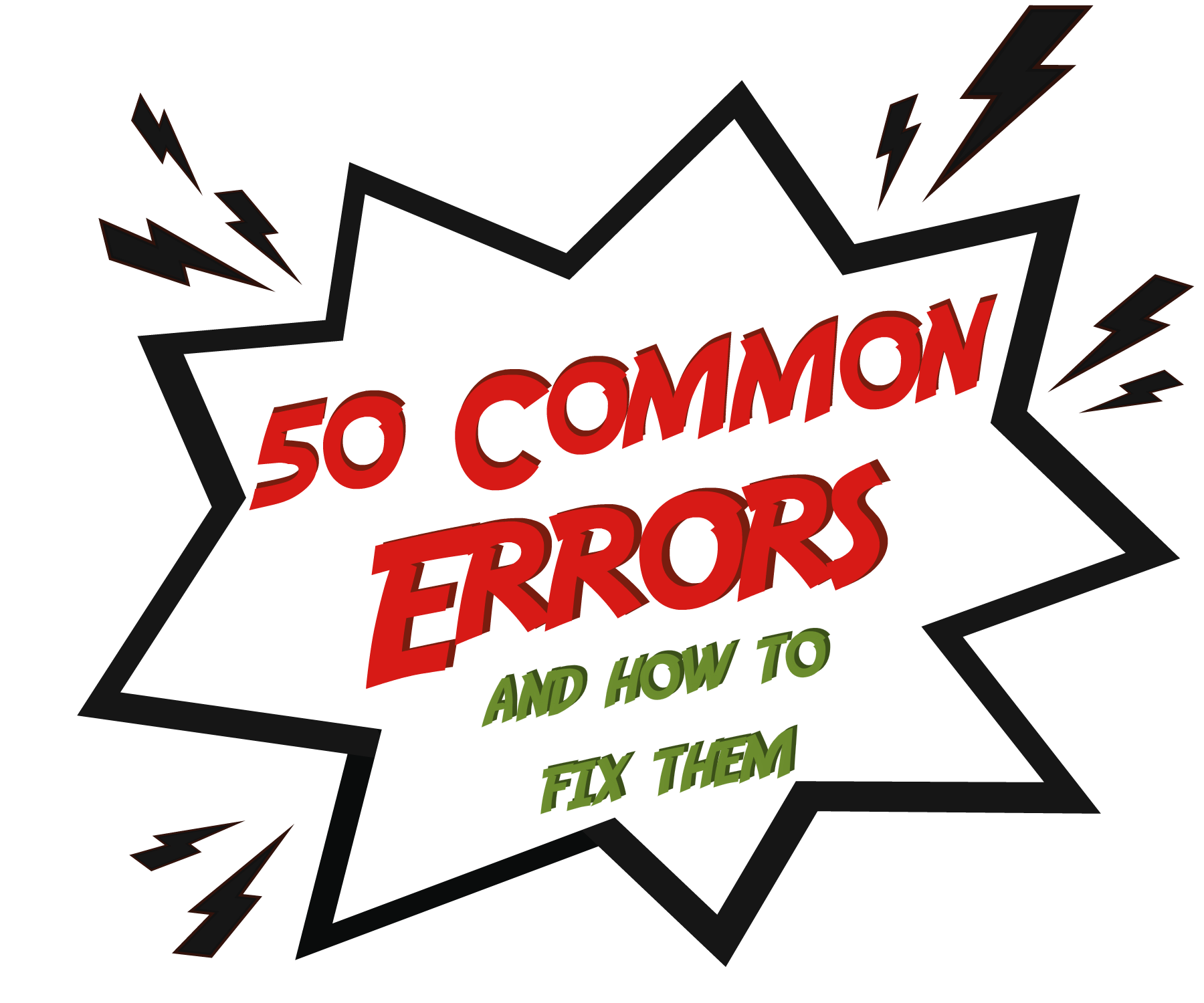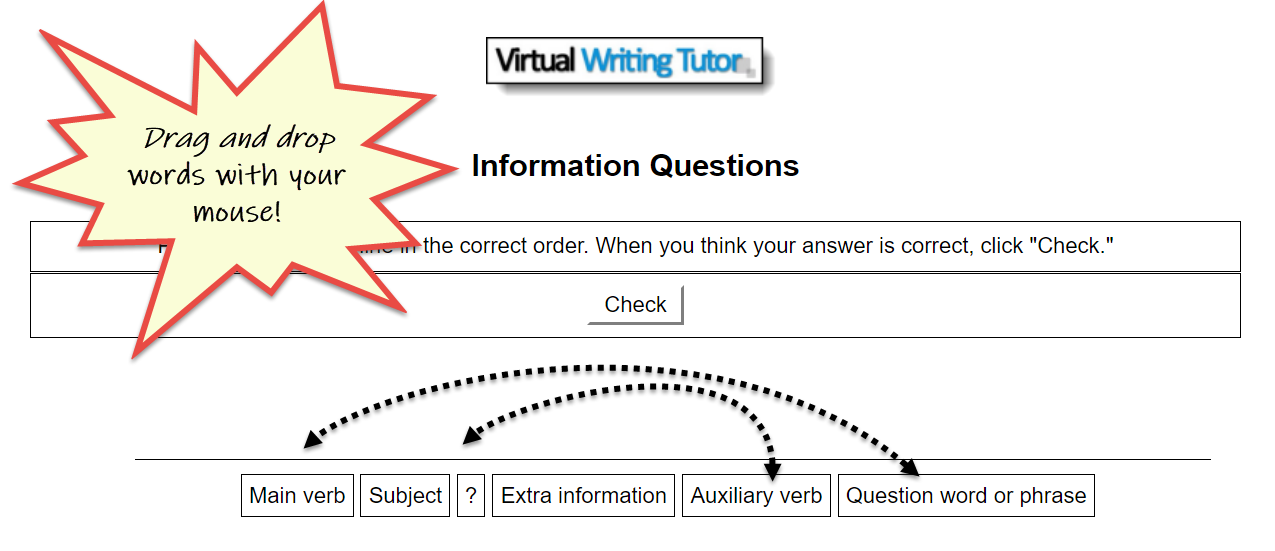Question forms in English can be tricky.Most questions require the inversion of the subject and the auxiliary. There are a number of auxiliaries to choose from, and auxiliaries must agree with their subject. This handy guide will help you eliminate common errors and ask correctly formed questions.

The Virtual Writing Tutor grammar checker can catch many question formation errors. Study each one below carefully so that you can eliminate these question formation errors from your writing and speaking.
For extra practice, try the grammar practice activities here.
11 Common question errors
RULE: Don’t use do for all questions. A progressive verb form requires a form of the verb TO BE as its auxiliary. Use am, is, are, in the present tense or was, were in the past tense.
INCORRECT: Do I am saying it correctly?
CORRECT: Am I saying it correctly?
RULE: Don’t forget to use an auxiliary with progressive tenses.
INCORRECT: Why you spending money on things you don’t need?
CORRECT: Why are you spending money on things you don’t need?
RULE: Conjugate your DO auxiliary for the third person singular in the Simple Present.
INCORRECT: Do he need help?
CORRECT: Does he need help?
RULE: Make sure that your verb TO BE agrees with your plural subject.
INCORRECT: How was your classes yesterday?
CORRECT: How were your classes yesterday?
RULE: When no auxiliary is needed because the question word is the subject of the verb, conjugate the verb for the third person singular.
INCORRECT: What make you smile?
CORRECT: What makes you smile?
RULE: Invert the subject and auxiliary verb.
INCORRECT: Why you do not like English classes?
CORRECT: Why do you not like English classes?
CORRECT: Why don’t you like English classes?
RULE: Use only one auxiliary.
INCORRECT: Why do you don’t like salad?
CORRECT: Why don’t you like salad?
RULE: Don’t double your subject. One is enough.
INCORRECT: What it’s your favourite sport?
CORRECT: What’s your favourite sport?
RULE: Use the Present Perfect when asking about the past leading up to the present with “how long” or “how many years.”
INCORRECT: How many years do you play soccer?
CORRECT: How many years have you played soccer?
RULE: Use an article or plural noun in questions with countable nouns.
INCORRECT: Do you have uncle or aunt?
CORRECT: Do you have uncles or aunts?
CORRECT: Do you have an uncle or an aunt?
RULE: Do not invert your subject and verb when you embed a question in a sentence.
INCORRECT: The About page explains what is the Virtual Writing Tutor.
CORRECT: The About page explains what the Virtual Writing Tutor is.

Question Forms
| Tense → Aspect ↓ | Past | Present | Future |
| Simple | Did I make mistakes? Did you make mistakes? Did he make mistakes? Did we make mistakes? Did they make mistakes? | Do I make mistakes? Do you make mistakes? Does he make mistakes? Do we make mistakes? Do they make mistakes? | Will I make mistakes? Will you make mistakes? Will he make mistakes? Do we make mistakes? Will they make mistakes? |
| Progressive | Was I making mistakes? Were you making mistakes? Was she making mistakes? Were we making mistakes? Were they making mistakes? | Am I making mistakes? Are you making mistakes? Is she making mistakes? Are we making mistakes? Are they making mistakes? | Will I be making mistakes? Will you be making mistakes? Will she be making mistakes? Will we be making mistakes? Will they be making mistakes? |
| Perfect | Had I made mistakes? Had you made mistakes? Had he made mistakes? Had we made mistakes? Had they made mistakes? | Have I made mistakes? Have you made mistakes? Have he made mistakes? Have we made mistakes? Have they made mistakes? | Will I have made mistakes? Will you have made mistakes? Will he have made mistakes? Will we have made mistakes? Will they have made mistakes? |
Adding Question Words
| Tense → Aspect ↓ | Past | Present | Future |
| Simple | What did I do? What did you do? What did she do? What did we do? What did they do? | What do I do? What do you do? What do she do? What do we do? What do they do? | What will I do? What will you do? What will she do? What will we do? What will they do? |
| Progressive | What was I doing? What were you doing? What was he doing? What were we doing? What were they doing? | What am I doing? What are you doing? What is he doing? What are we doing? What are they doing? | What will I be doing? What will you be doing? What will he be doing? What will we be doing? What will they be doing? |
| Perfect | What had I done? What had you done? What had she done? What had we done? What had they done? | What have I done? What have you done? What have she done? What have we done? What have they done? | What will I have done? What will you have done? What will she have done? What will we have done? What will we have done? |

